

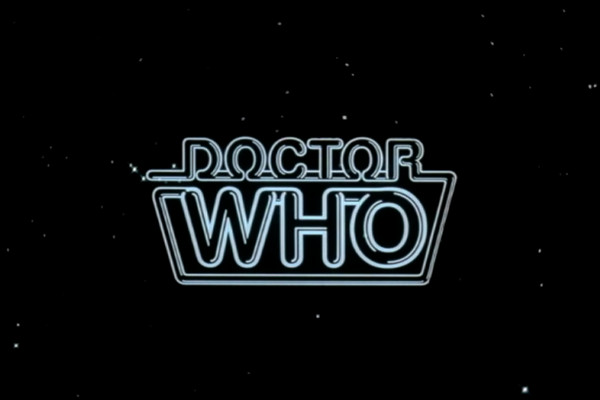
Peter Davison starred as the Doctor in twenty stories from 1982-1984. (We won't count his brief, silent cameo in Logopolis for our purposes here). Join me as I rank his run, from worst to best...
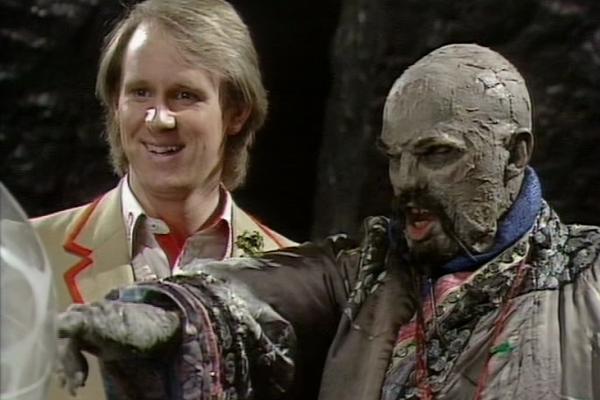
Every bit as bad as its reputation, Time-Flight has a nonsensical plot, inadequately brought to screen. The original series of Doctor Who was often unfairly accused of being cheap, but that's very much the case here with a "prehistoric Earth" that creaks as the cast walk along it.
If there's one major bane of the Davison era, it's that a large number of the directors involved in bringing it to life simply weren't dynamic enough for a show of its nature. Novice director Ron Jones struggles here, his "everyone stand in a line and I'll do it all as a wide shot" approach to direction failing to satisfy. Some of the cast have fun sending up the silly plot, and it's amusing watching Davison trying not to laugh on screen, but it's awful stuff when all said and done.

A special for Children In Need and a crossover with Eastenders, this would probably be better remembered as a throwaway piece of fun if it wasn't for the fact that the people involved appear to be taking it seriously. The 14 minute special was watched by more people than any Doctor Who story since 1979, with a confused, continuity-heavy plot that would doubtless make most of those casual viewers realise why the show had been axed four years earlier.
It's tempting to try and reclaim the special as a camp masterpiece, but it's so awful it's almost impossible to do so. That said, the 3D gimmick is obviously very in vogue today, and Colin Baker/Bonnie Langford give arguably their best onscreen performances in their roles. As for Davison, his part lasts just two minutes, and seems to be an unwitting commentary on his own, vulnerable Doctor – when in danger he mentally conjures up the more physical and dynamic third Doctor to deal with things. Jon Pertwee was 74.
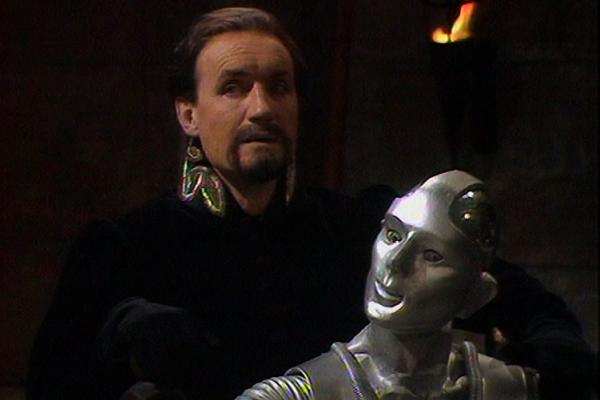
A two-part story was an unusual length for Doctor Who... in fact, before Davison came along the show had gone for a 17 year stretch with only one instance of the format.
Peter Davison was saddled with a two-parter for every year he was the Doctor, an unwieldy length that never really gave the writers chance to tell a developed tale. This is never more true than with The Kings' Demons, arguably the most inconsequential story the original series ever told. Featuring a useless singing android that never worked properly, the Master as a French knight with a Welsh-Iranian accent, and a narrative that grinds to a halt well before the end of the runtime, this is lacking stuff. Possibly the most shocking moment comes when Antony Ainley's entertainingly hammy Master takes off another pathetic disguise with the meaningless line "Oh my dear Doctor, you have been naïve."
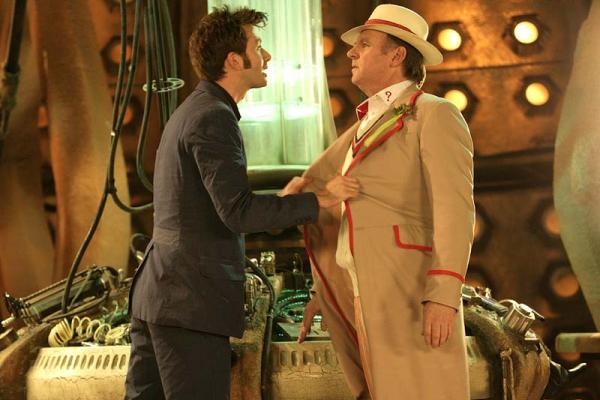
Another Children In Need special, this time featuring Peter Davison playing someone not really at all like the fifth Doctor 23 years after he left the part. Starring opposite his now son-in-law, it features that curious New Who mix of paying constant lip service to the past while also continuously mocking it. So it is we get the asides about the (admittedly awful) celery, and mentions of "desktop themes". This kind of stuff would be okay if it were a one-off for charity, but the painfully self-deconstructing Doctor Who from 2005 onwards is always like this.
Davison might not be that fond of all his stories from when he was the Doctor, but there was no dialogue he had from 1982-1984 as woeful as "wibbly wobbly, timey-wimey", and no writer idiotic enough to think that such a line is genuinely clever and witty. This is the problem with the new series, in that the authorial voice can be heard throughout. There's often no real attempt to tell a story, just a smug self-reflexivity screaming out "look how self-parodying we're being!" over and over, drowned in Murray Gold's "laugh here" music.
The Davison years often weren't a high bench mark for Doctor Who. They had some really bad companions, some lacklustre stories and were often sluggishly directed. But at the heart of them all they had an earnest - some might say too earnest - approach to developing a narrative. Anyone can take the piss, it takes a real pro to tell a story. Sadly, it's a skill that most of the new production team seem to have forgotten.

The line in the sand between Doctor Who as a populist programme for the masses and Doctor Who as a programme for fans. Omega, the Matrix, Borusa, Gallifrey... they're all introduced without any explanation for casual viewers who may want to get in on the fun.
A cheaply made story, badly directed by Ron Jones, here his "stand in a line and it'll do" sensibilities are brought to a Gallifrey that looks like a particularly cheap branch of IKEA. Peter Davison was asked if he wanted to sign for a fourth year during the recording of this season, and there's no record of when exactly he made the decision not to. However, you suspect that the part where he gets twatted by a giant rubber chicken possibly had some say in him making up his mind.
The best parts of the episode come where Davison plays Omega in a duplicate of the Doctor's body. As this is old school Who then we get a location shoot in Amsterdam without ever seeing one of the prostitutes inappropriately name-checked in the 2005 series (it's supposed to be a family show, remember?), and no hint of anyone having a special smoke. But what we do see is child-like wonder in Davison's eyes, as he wanders the streets trying to find peace. It's a nice moment in a story that really doesn't work on most levels.

One of most-regarded Davison stories, the functional script of this "aliens in 1666" tale is a very traditional plot. However, arguably the major flaw of the Davison years were the original actors he had as co-stars. Fielding and Sutton improved throughout their run, but Matthew Waterhouse was always too inexperienced and unnatural, even with the kindest eye. Add to this chronic direction and a climax that sees Waterhouse kicking an android up the arse and it's a messy affair. Like one of my good friends used to say about parts of the Davison run, with acting and direction as bad as this then it's a "fundamental failure of craft".

Deep down there's a lot of potential with this story, and I do think it's better than its reputation. However, Davison's third and final year saw a new direction on the show, where stories would be plot rather than character driven. This is especially evident with the companions. Like them or loathe them, Tegan and Turlough were two of the most original characters ever to travel with the Doctor, but in 1984 they became generic archetypes. Quite how Tegan develops empathy and 20 extra IQ points is never really explained, and the chemistry between the three leads is distant as a result.
Warriors of the Deep begins this theme of the narratives being progressed not by logic but by dramatic necessity: just as Turlough becoming a cold blooded, gun-toting bad ass is completely out of character, having the passive fifth Doctor being antagonistic and kicking people in the face is totally implausible. The end result is the "drama" that the crew of the seabase where they land don't know whether or not to trust them, but if the Doctor hadn't behaved so far out of character they'd have had no reason to mistrust him in the first place.
Such totally irrational developments continue throughout, such as the TARDIS being left unlocked (so that it conveniently resolves a plot point) and a cold, clinical scientist deciding to karate kick a sea monster (pictured). Perhaps most damning of all is the story's need to remove all sense of build up or suspense, such as revealing the ineptly-recreated monsters within the first two minutes, or revealing the presence of gas that could kill them in the first episode. It's a bit like watching a murder mystery where Inspector Poirot starts the story by saying "the butler did it" and then expects you to sit through ninety minutes of bullshit afterwards.
Compounding the misery is script editor Eric Saward's love of macho bombast, with plenty of needless deaths that seem like overkill. This was a period of heightened cold war tensions, where productions like Threads, The War Games and The Day After littered TV and cinema screens. Warriors of the Deep tries its best, but ultimately for parallels of US-Soviet tensions then Rocky IV was arguably more subtle.
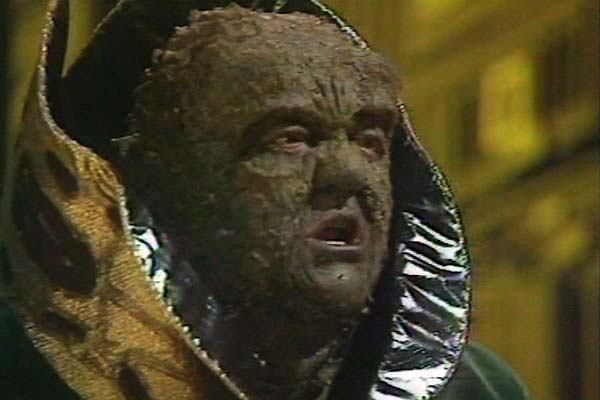
A four part story with two episodes of plot, this one does at least see a decent guest performance from Stratford Johns as an alien frog. Sadly, he's forced to spend the runtime sat on his backside, while an out-of-character Davison (in his first recorded story) makes a few semi-racist remarks about Burt Kwouk.
Such an element of parochialism seems to be part of the fifth Doctor's character traits... he's a man who talks, inexplicably, about how he wanted to be a train driver as a boy (Black Orchid) and his mistrust of the concept of a "French knight" (The Kings' Demons). As with The Visitation, there's nothing fundmentally bad about this story, it's just that its charms are sunk by the significant drag factor of early Fielding and Waterhouse at the peak of his powers.